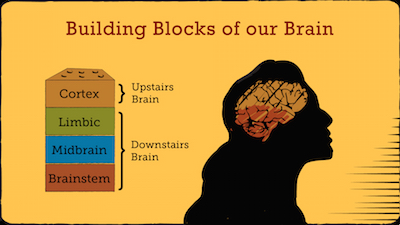Module 2: Job Stress
Neurobiology of Stress
The body’s stress-response system is naturally activated when you feel threatened. Our perception of life-events or work pressures is highly subjective; it can be very stressful to one person yet easier to cope with by another. While we may love our work, there are aspects of it that may be stressful.
Stress and the feelings you described are a natural response to things we are anxious about or think we don’t have control over. Dr. Linda Chamberlain will now talk about the effect stress has on our brain and body.
The Brain and Body Connection Under Stress
Linda Chamberlain, PhD, MPH
Click here to view or download the slides Linda uses in her presentation.
Dr. Chamberlain talks about how stress effects the brain and body. She refers to the upstairs brain and the downstairs brain.
Upstairs Brain: Prefrontal cortex (the thinking part of the brain).
Downstairs Brain: Limbic system (we use to quickly react).
When we are under stress, our prefrontal cortex shuts down and we often use our limbic system to respond. When this happens we are not always making the best decisions.

Here’s an example of how the “downstairs brain” and “upstairs brain” might respond to a situation:
Your 8 year old keeps asking for soda money. You’ve already told him “NO!” numerous times, but he keeps asking…
Downstairs brain response:
I lost it and started shouting at him.
Upstairs brain response:
I took a few deep breaths, first gathered my thoughts together and said:
No! Think back, why did I tell you “No” before? It's the same reason.
(This assumes you gave him a reasonable answer before).